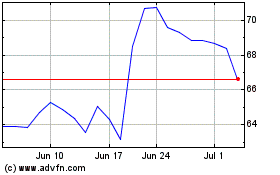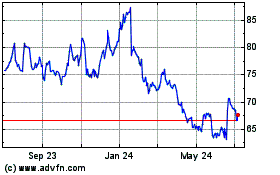BEIJING--Clinical trials being conducted in Wuhan to test Gilead
Sciences Inc.'s antiviral drug, a promising remedy for the new
coronavirus, are going more slowly than hoped for as the drugmaker
struggles to recruit qualified patients, underscoring the
challenges in quickly developing drugs during outbreaks.
The trials, aimed at testing more than 700 patients infected
with the Wuhan coronavirus, have succeeded in recruiting fewer than
200 people after 10 days.
A total of 168 patients with severe symptoms, and 17 patients
with mild and moderate symptoms, were recruited at 11 medical
institutes across Wuhan, Zhang Xinmin, an official from China's
Ministry of Science and Technology, said at a Saturday press
conference.
The trials were first announced on Feb. 5 at Wuhan's Jinyintan
Hospital, one of the main facilities treating coronavirus patients
in the city at the epicenter of the outbreak. According to
state-run Xinhua News Agency, the plan for the trials is to recruit
761 patients infected with the virus. They are to include 308
patients with mild and moderate symptoms and 452 with severe
conditions.
Severely ill patients had to be within 12 days of the illness's
onset and couldn't have taken other treatments within the past 30
days to qualify, according to the screening criteria. Mild and
moderate patients who want to join trials needed to be within eight
days of the illness's onset. All candidates had to have positive
lab results for the infection.
These criteria have practically ruled out most candidates, since
many patients in Wuhan have started taking medication at
home--either those recommended by state media or based on anecdotes
they read online while waiting to be admitted to hospitals.
Other patients with apparent symptoms, meanwhile, have received
negative results in potentially flawed laboratory tests.
According to video footage from Xinhua, Gilead's drug, known as
remdesivir, was first administered intravenously on Feb. 6 to a
68-year-old man who had developed severe symptoms and was treated
at Jinyintan Hospital. It is unclear whether the patient was given
the drug as part of a trial or for emergency use.
Zhao Jianping, a doctor at Wuhan Tongji Hospital who is heading
a team advising on the treatment of coronavirus patients, said in a
Feb. 7 press conference that two-thirds of the severe patients in
the trials would be given the drug while the other third would be
given a placebo. Those in the placebo group would also receive the
standard treatment, Dr. Zhao said.
A Gilead spokeswoman said the two studies, for severe and more
moderate cases, were initiated about a week apart and are being
conducted by Chinese officials, not Gilead. "Any questions about
the status of those studies would be best addressed by the
principal investigator," she said.
Beijing pulmonologist Dr. Cao Bin, a prominent researcher
deployed to Wuhan to help lead the medical care of patients as well
as the two clinical trials, didn't respond to requests for
comments.
Other than remedesivir, the antimalarial drug chloroquine and
the influenza drug favipiravir have also shown some efficacy in
clinical trials, Mr. Zhang of the Ministry of Science and
Technology said Saturday.
Sun Yanrong, another official at the ministry, said separately
on Monday that, based on preliminary clinical trials results, it
appeared chloroquine was effective in treating the new coronavirus,
with no severe side effects.
Experts have suggested including chloroquine, a drug that has
been in clinical use for over 70 years, in the next national
guidelines for treating the coronavirus, Ms. Sun added.
State-owned pharmaceutical giants China Resources Pharmaceutical
Group Ltd. and China Medicine Health Industry Co. are ramping up
productions of chloroquine, Zhao Shitang, an official with the
state-owned Assets Supervision and Administration Commission said
today.
Favipiravir has shown better efficacy with fewer side effects in
a controlled study against Kaletra, an antiretroviral for HIV made
by U.S. pharmaceutical giant AbbVie Inc., Shenzhen No. 3 Hospital
in southern China said last week in a statement on its website
recommending broader clinical use of the drug. The study was based
on 80 patients infected with the new coronavirus, the statement
said.
China's drug authorities last week approved favipiravir, a drug
developed in Japan to treat influenza and which has also shown
signs of efficacy against the Ebola virus, as a second-line
treatment for influenza.
Favipiravir was also approved to be used in clinical trials of
the new coronavirus, government data shows.
Zhejiang Hisun Pharmaceutical had an exclusive licensing
agreement with Fujifilm Holdings Co. in 2016, but the patent
expired last year, Zhejiang Hisun said in a company filing Monday.
Hisun started production of the drug on Sunday.
Fanfan Wang
(END) Dow Jones Newswires
February 18, 2020 00:41 ET (05:41 GMT)
Copyright (c) 2020 Dow Jones & Company, Inc.
Gilead Sciences (NASDAQ:GILD)
Historical Stock Chart
From Mar 2024 to Apr 2024

Gilead Sciences (NASDAQ:GILD)
Historical Stock Chart
From Apr 2023 to Apr 2024
